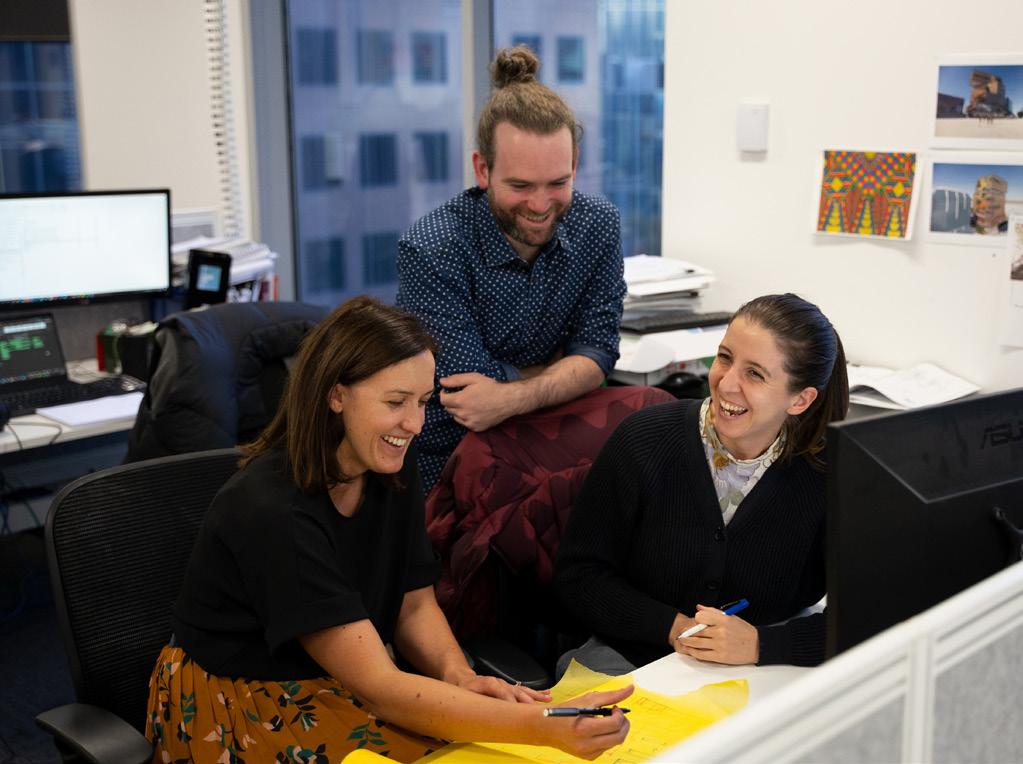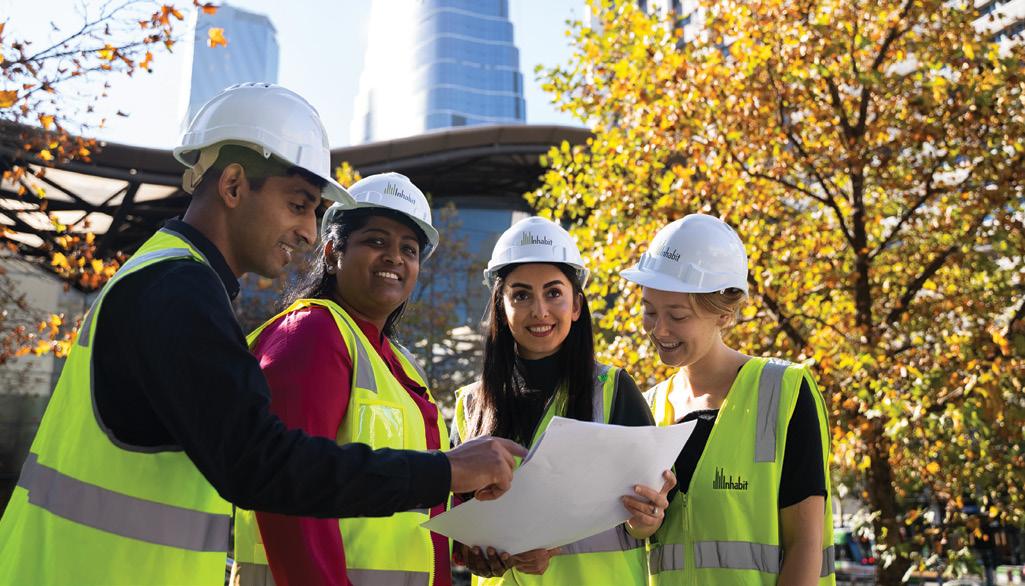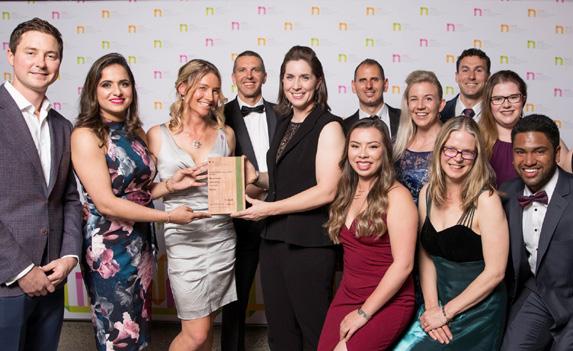
6 minute read
by Elissa Stirling, Inhabit
MENTORING IS KEY TO A STRONG CAREER PATHWAY
by Elissa Stirling
Advertisement
Regional Manager - Victoria, Inhabit & NAWIC Member
In 2019 the Victorian Government, in partnership with the Building Industry Consultative Council, launched a three-year strategy, Building Gender Equality: Women in Construction1, to make women aware that construction is a viable and rewarding career option. The strategy calls for inclusive and adaptive workplaces to ensure that women stay in the industry. “There will only be equal numbers of men and women working in construction if we take steps to attract, recruit and retain female workers,” Tim Pallas, Treasurer and Minister for Industrial Relations, said on launching the strategy. The strategy addresses issues such as the lack of encouragement for girls interested in science, technology, engineering and mathematics (STEM), few role models for girls, traditional views of men’s work and women’s work, gender stereotypes and rigid workplace practices and cultures of prejudice that exclude women and treat them as ‘others.’ Key to the strategy is that while women must be proactively recruited, they must have access to strong career pathways. A collaborative study between the University of Sydney and Queensland University of Technology2, published in the Journal of Management in Engineering in March this year, found that “while the construction industry is attracting women, and women are studying engineering and project management at a tertiary level, very few of these candidates are being properly progressed once they enter the workforce. This is not for lack of desire or motivation but is due to organisational issues.” While the first step is providing a robust policy for gender equality, real change occurs from within an organisation’s leadership team and providing support to women to navigate the challenges that arise. Mentoring is key to this. I believe it is the responsibility of a company to engage and empower the next generation of graduates, regardless of gender, through training and structured, supportive mentoring. Mentoring can make a profound difference in the development of a young person’s life when it is based on mutual respect, trust, sharing of knowledge and good communication. What I love about mentoring is that I learn as much as I teach - there is no hierarchy. It is twoway communication and is as good for my own professional development as it is for my mentees’. They have new and interesting perspectives on technology, the industry and society in general. It is a positive to have them engaged in creating a vibrant culture by challenging and contributing. Growing up with many of my family and close friends as teachers, sharing knowledge and experience, is part of who I am. I enjoy teaching and am happy to spend time supporting our team in the way I have been supported throughout my career. In the 14 years I have spent in the construction industry I have found that people who share their knowledge tend to form supportive networks and create an engaged and creative workplace. While studying architecture and construction management and in my first job in the construction industry, I was fortunate to work with David Hunton, one of the great icons of the façade industry in Australia. It was David who got me excited about construction and who shared his passion for
1. https://www.vic.gov.au/victorias-women-construction-strategy 2. https://www.sydney.edu.au/news-opinion/news/2021/03/11/is-construction-dawdling-on-gender-progress-.html
Elissa Stirling with Michael Crowley and Gemma Ambrosio from the Inhabit Façade Consulting team

façade design and engineering. He also gave me an appreciation for mentoring and how important it is to build a foundation for junior employees. After working in Sydney and London I returned to Melbourne, looking for my next challenge and was drawn to join David again, where he was a Technical Director at Inhabit. As you progress in seniority through a company and are focused on managing people and projects, it is possible to lose touch with technical aspects of your field. David’s ongoing mentoring at Inhabit meant we were always learning. Even in retirement he continued to advise and inspire and his passing in 2019 had a real effect on me as I reflected on the huge impact he had on my career. A legacy he left behind for many that he mentored. Inhabit CEO Tony Alvaro continues to be a great mentor of our global team and also within the industry. He is strongly committed to supporting employees to achieve their full potential in an environment which fosters equity, fairness and diversity. We are now at a point where globally, Inhabit has 32% women in its workforce in a wide range of key roles including regional director, technical director, regional managers and associates. In Melbourne that figure increases to 47%. During my career I have seen significant and positive change in the way women are treated in construction, but their retention in the industry is not just a ‘women’ problem. It falls on us all to make gender equality a reality. My philosophy on gender is that promoting women to get them up the ranks quickly puts unhealthy pressure on them, doesn’t promote equality nor necessarily deliver great results. It is better to treat everyone equally and encourage a culture of equality for the long term. I don’t think we will have true equality in the workplace unless we get equality in the home. When men are reluctant to take paternity leave because it’s frowned on by their company, then it falls on women to juggle maternity leave, childcare and the demands of their jobs. Real change occurs when men in senior positions take paternity leave and it sets the tone, allowing more junior men to say “It’s okay for me to do so too.” The pandemic has certainly changed how we work.
I’ve found that the pandemic has improved our work from home set-up and businesses are more accommodating of flexible working arrangements. Clients are more receptive to taking my call where there may be a child in the background. Perhaps in Melbourne, because of the prolonged lockdown and closure of childcare, we’ve all had a window into other peoples’ lives and feel more comfortable seeing women combine business and family in a new way. As Victorian Regional Manager I’m now in a role where I am responsible for recruitment and I’m challenging myself to examine my unconscious bias. It is well established that we unconsciously look more favourably on people who are like us, whether it’s by gender, sexual orientation, race, ethnicity or nationality and, unless we question the choices we are making, we may not end up with the best person in the job. Or, worse, we end up with a workplace that lacks the stimulation of diversity. Whilst we still have a way to go in achieving gender equality at Inhabit, our progress is encouraging. Currently I am working with the next generation in my team to understand social procurement and sustainability. As part of that we focus on gender diversity, we are also looking at equality for people living with a disability, the rights of First Nations people, our response to domestic violence and how our business engages with these issues in a meaningful way. Our goal is to have more diversity in our workforce - how we achieve this is the next big challenge for the construction industry.

Imagine building a better future
W | inhabitgroup.com E | contact@inhabitgroup.com | | |@inhabitgroup

NAWIC ACT Diversity and Inclusion Award Winner 2019 – Manteena









